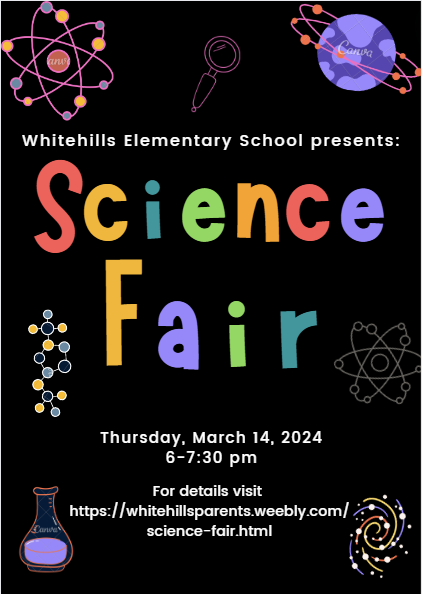Whitehills Science Fair
The 2024 Whitehills Science Fair will be Thursday, March 14, 2024 from 6:00-7:30 PM!
Come and see the fun stuff your schoolmates have made! Come and show off a project you made yourself!
Come and see the fun stuff your schoolmates have made! Come and show off a project you made yourself!
| Registration Form | |
| File Size: | 91 kb |
| File Type: | |
How to get ideas for an awesome science or engineering project! Science is about carefully observing and using our brains to understand how things work. Engineering uses science to build or fix things.
Your project can be a demonstration, an experiment, a collection, or some combination of those. The best projects are about things you think are important. Think about something you're excited about, or a problem you want to solve.
The three most important things about doing a project are:
Lots of places on the internet can help you do a great project! Here are a few, and you can find more with DuckDuckGo, Google, or other internet search engines or at the library:
| TeachersTryScience.org | ScienceBob.com | Bill Nye the Science Guy | Education.com | ScienceBuddies.org (including a great guide for parents) |
Science works with anything! You can do projects about:
Your project can be a demonstration, an experiment, a collection, or some combination of those. The best projects are about things you think are important. Think about something you're excited about, or a problem you want to solve.
- A demonstration shows how something works. For example, you could make a strong bridge using only toothpicks, or a drawing that shows where the planets in our solar system are, or make a model of a camel's digestive system using clay.
- An experiment tries to answer a question. Everybody does experiments every day, even if they don't realize it:
- Think of a question that is important to you. For example, "Have I grown too big for these shoes?"
- Figure out a way to answer the question. "Maybe I could try putting my foot in the shoe?"
- Actually answer the question by doing what you figured out. Write down what you learned. "I loosened the laces and tried really hard, but I can't get my foot in the shoe. I measured my foot, and it's 5 inches long, but the shoe is only 4 inches long."
- Share what you learned with other people. "Dad, I discovered that my shoes are too small, can we get new shoes?" For a science fair project, this often means making a poster describing what you learned.
- A collection is a group of similar items that you've described and classified (it's not enough to just bring a bunch of stuff in a box). Describing, classifying, and displaying a collection helps people understand the similarities and differences among the items. Classic examples are rock collections and insect collections, but there are many other possibilities (leaves, tools, toys, seeds, feathers, drawings, etc.).
The three most important things about doing a project are:
- Things hardly ever work perfectly the first time, so don't feel bad if there's a problem with your project, just think it over and try again;
- Write down notes and drawings about what you learn in a notebook; and...
- Other people can help! You can team up with friends or family. If your project isn't working right, show your notebook to someone else, talk it over, come up with new ideas, and try again! Professional scientists work with other people all the time, they just have a big word for it ("collaboration").
Lots of places on the internet can help you do a great project! Here are a few, and you can find more with DuckDuckGo, Google, or other internet search engines or at the library:
| TeachersTryScience.org | ScienceBob.com | Bill Nye the Science Guy | Education.com | ScienceBuddies.org (including a great guide for parents) |
Science works with anything! You can do projects about:
- Geology and earth science (what the earth is made of, and how it changes)
- Physics (how matter or energy moves or changes)
- Computer science (understanding how computers work, and how to program them to solve problems)
- Chemistry (changing chemicals from one form to another; almost everything you can see or feel or smell is made of chemicals)
- Health and medicine (how people stay healthy, get sick, or get better)
- Economics (how we use money or resources to buy/sell/make/share things)
- Biology (plants, animals, germs, or any other living thing)
- Ecology (how living things interact with each other and with the world)
- Psychology and sociology (how people think or behave)
- Paleontology and archaeology (studying old things that used to be alive; studying old human cultures)
- Engineering and construction (designing and making a structure, a machine, or a tool)
- Mathematics (using numbers and logic)
- Astronomy (things out in the universe away from Earth, like stars, space, galaxies, planets, black holes, and comets)
